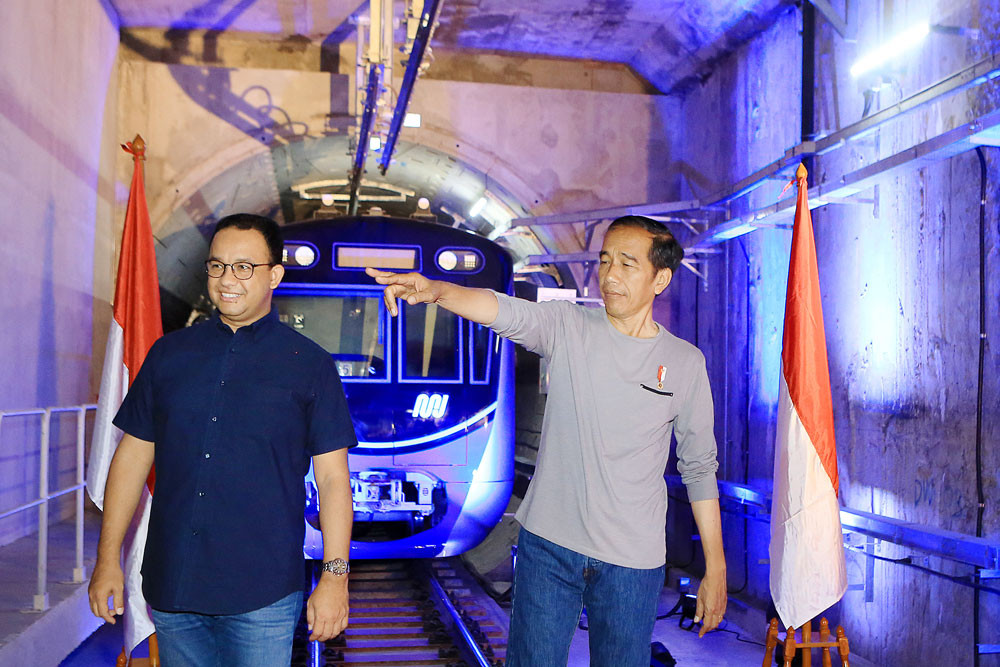Popular Reads
Top Results
Can't find what you're looking for?
View all search resultsPopular Reads
Top Results
Can't find what you're looking for?
View all search resultsPut MRT above politics
Political analysts agree that Jokowi took advantage of the MRT to bolster his electability, while Anies’ responses were a much-needed investment as he sets his sights on the 2024 presidential race and a second gubernatorial term in 2022.
Change text size
Gift Premium Articles
to Anyone
 President Joko “Jokowi” Widodo (right), accompanied by Jakarta Governor Anies Baswedan, inaugurates MRT Jakarta’s first line at Bundaran HI Station in Central Jakarta on Sunday. The service, which links the Hotel Indonesia traffic circle in Central Jakarta to Lebak Bulus in South Jakarta, is to be free of charge until March 31. (The Jakarta Post/Seto Wardhana)
President Joko “Jokowi” Widodo (right), accompanied by Jakarta Governor Anies Baswedan, inaugurates MRT Jakarta’s first line at Bundaran HI Station in Central Jakarta on Sunday. The service, which links the Hotel Indonesia traffic circle in Central Jakarta to Lebak Bulus in South Jakarta, is to be free of charge until March 31. (The Jakarta Post/Seto Wardhana)
T
he launch of the country’s maiden MRT system in Jakarta has regrettably descended into political bickering, with the elections right around the corner, between allies turned-rivals President Joko “Jokowi” Widodo and Jakarta Governor Anies Baswedan, particularly on the issue of fares.
Their supporters also jumped into the ring, with Jakarta Council speaker Prasetio Edi Marsudi from the Indonesian Democratic Party of Struggle (PDI-P) and Gerindra Party politician M. Taufik each proposing low fares. They eventually reached a compromise, setting the fares between Rp 3,000 (21 US cents) and Rp 14,000, depending on the distance of the trip.
Jokowi, who is seeking reelection, has also claimed credit for the MRT, saying the modern transportation mode would not be here without him as Jakarta governor and his then-deputy, Basuki “Ahok” Tjahaja Purnama. Delivering a counter punch, Anies sent a love letter to thank all MRT Jakarta employees for their hard work.
Political analysts agree that Jokowi took advantage of the MRT to bolster his electability, while Anies’ responses were a much-needed investment as he sets his sights on the 2024 presidential race and a second gubernatorial term in 2022.
The unnecessary politicization of the MRT only shows the shortsightedness of our elite, while in fact the megaproject is a long-term investment with the aim of serving the public well and solving mobility problems facing metropolitans.
Jakarta still has a long way to go to build an MRT system that can rival those of big cities in other parts of the world like Singapore, Tokyo, New York or even New Delhi. Jakarta still has to raise a lot of money to fi nance the second phase of the MRT’s north-south lane and east-west route.
It will take the eff ort of several presidents, governors, MRT Jakarta directors and thousands of workers to complete the dream MRT system. And don’t forget the subsidy that millions of taxpayers have to bear and the land many residents have to give up to realize the MRT.
The fi rst phase, a 15.7-kilometer route connecting Lebak Bulus in South Jakarta and Hotel Indonesia traffi c circle in Central Jakarta, cost Indonesia Rp 16 trillion.
The second phase, which will expand the existing route to Kampung Bandan in North Jakarta, is estimated to cost an even higher Rp 22.5 trillion, because it will have more underground stations along its 8.3 km route.
MRT Jakarta has targeted to complete the second phase in 2024, 12 years after its groundbreaking during the term of Fauzi Bowo. It may also take about the same time to build the east-west route connecting Cikarang in Bekasi and Balaraja in Tangerang, but just recently Jokowi said he wanted the project to go in parallel with the second part of the south-north lane’s construction.
Indeed sacrifice is a must for Jakartans if they want to brag about a sophisticated, iconic public transit system that will solve their long-standing traffi c malady. A lot more work will have to be done and for this reason everybody, especially politicians, has to put the MRT beyond politics.









